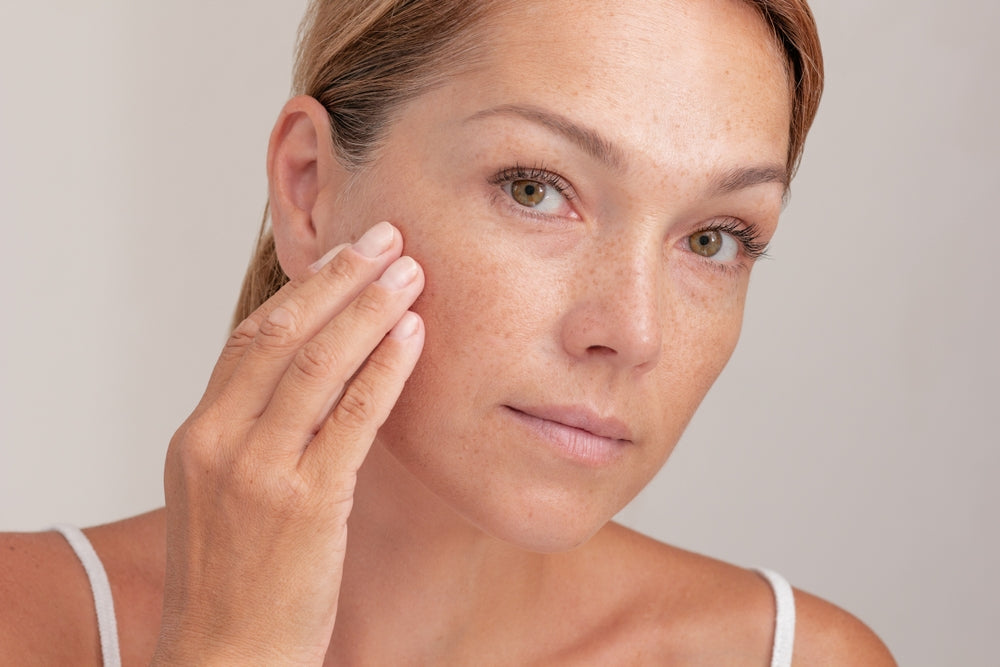Sunscreen is arguably the most important part of an effective anti-aging skincare routine for a few key reasons. By helping to protect the skin from the harmful effects of ultraviolet radiation that’s all around you, sunscreen not only helps prevent sunburn but can also help the overall appearance of the skin.
But did you know that not all sunscreens are created equal? There are crucial differences in the formulation of many commercially available sunscreens that affect their reliability and even the chemical impact on the environment, so it’s helpful to know how sunscreen works and which ingredients you should prioritize when choosing the best sunscreen for everyday use.
How Does Sunscreen Work?
All sunscreen must be approved by the FDA to be safe and effective at absorbing or reflecting harmful UV rays that are constantly being emitted by the sun. There are several wavelengths of UV rays that are harmful to skin cells, primarily UV-A and UV-B rays. A good sunscreen protects against both wavelengths, which is commonly referred to as being “broad-spectrum” sunscreen.
Different formulas of sunscreen are effective in different ways. Sunscreens with mineral active ingredients reflect UV energy, preventing it from penetrating to skin cells and causing damage. Chemical-based sunscreens, on the other hand, work by absorbing the UV light and converting it to heat energy before it reaches your skin.
Chemical Vs. Mineral Sunscreen
The two types of sunscreen available to people in the U.S. are chemical and mineral sunscreens. Chemical sunscreens can be cheaper and easier to obtain, but have downsides as well. Some chemical ingredients, like oxybenzone, can interact with the body and cause side effects like disrupting hormone levels or causing skin irritation. Even worse, these ingredients can wash off the skin and interact with the environment: for ocean-goers, this can lead to environmental damage like coral reef bleaching.
Mineral sunscreens utilize physical compounds like titanium oxide and zinc oxide to reflect UV rays rather than absorb and disperse them. They work by sitting on the skin and acting like microscopic mirrors for up to two hours at a time before needing reapplication. The benefits of mineral sunscreens is that they can be longer-lasting and more effective than chemical formulas, when created with high-quality and complementary ingredients like natural plant extracts.
What is Zinc Oxide Sunscreen?
Zinc oxide sunscreen is the best mineral sunscreen you can buy, as it has multiple advantages over other mineral active ingredients. As previously mentioned, mineral sunscreens are usually the better choice over chemical ones for both physical and environmental reasons. Zinc oxide goes above and beyond by providing protection from both UV-A and UV-B rays, while titanium oxide is only guaranteed to block UV-B rays. This broad-spectrum protection means you are less likely to burn while wearing zinc oxide sunscreen and can be beneficial for individuals concerned with signs of aging like wrinkles and pigmentation.
Zinc oxide sunscreen can be used when you know you’re going to be spending time enjoying a sunny day — perhaps while on vacation — as well as for everyday use, as there are UV rays bouncing all around you even on cloudy days.
Zinc Oxide Perfecting Sunscreen SPF 27 from Epicuren Discovery
Take advantage of the proven benefits of zinc oxide sunscreen with our Zinc Oxide Perfecting Sunscreen. This lightweight, completely transparent formula goes on smoothly with no greasy residue. Use every day as needed to help protect against sunburn on both your face and body. Find other professional skincare products by browsing our website or taking our Skin Quiz to find personalized recommendations for your unique skin type.





